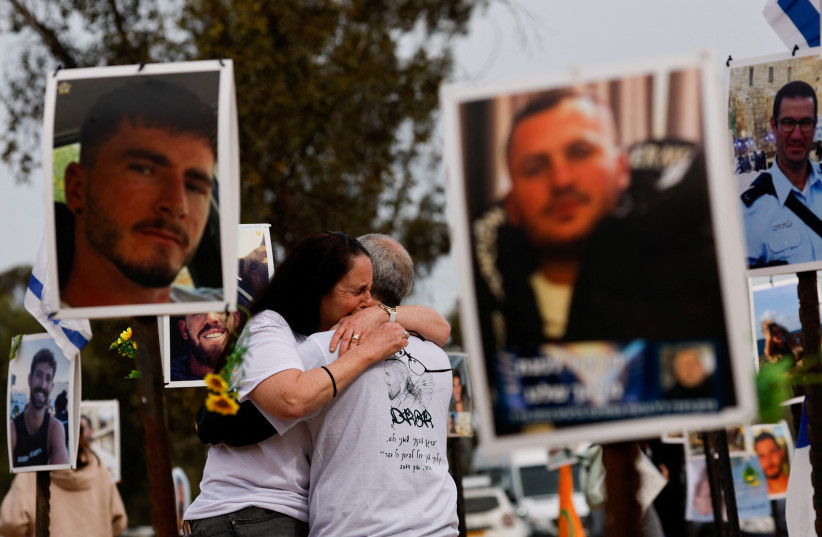International Women’s Day, which celebrates the social, economic, cultural, and political achievements of women, is marked across the globe with pertinent events, conferences, festivals, and performances.
However in Israel, this year, International Women’s Day will be commemorated but not celebrated.
The events of October 7 raised many questions about the status of women, the relationship between women’s issues and political agendas, and, most significantly, about global solidarity for female victims.
On that terrible day, thousands of terrorists invaded more than 30 communities in southern Israel. Hamas had trained them to murder, torture, and kidnap Israelis, and to target women and girls in particular for rape and sexual mutilation.
By day’s end, more than 1,200 had been murdered and 253 men, women, and children were abducted to Gaza. Entire families were tortured and burned to death in their homes. Young attendees at the Nova music festival were hunted down for hours. Many suffered unspeakable sexual abuse. The vast majority of the victims of Hamas’s sexual crimes, which included gang rape, did not live to tell the tale.

Using rape as a weapon of war is a war crime and can be considered a crime against humanity. Inspired by their fellow radical Islamist groups, including ISIS in Syria and Boko Haram, Hamas deployed sexual violence as a tactic designed to humiliate, torment, and ultimately defeat a civilian population by breaking its spirit.
Yet astonishingly, across the globe, too many relevant parties – including international organizations, supposed human rights groups, academic institutions, and women’s groups founded to be a voice for victims of sexual assault – refused to stand up for the Israeli victims.
If their thunderous silence wasn’t bad enough, outright denial of Hamas’s crimes soon followed, despite multiple reports from independent and highly credible sources. Denial quickly evolved into victim blaming, negating any progress made by the #MeToo movement. Inexplicable to any rational and moral person, some even expressed empathy with the attackers and justified their actions.
In light of these abuses of Israeli women, this year we are not planning to mark International Women’s Day as a festive event. Unlike previous years, Israel’s many achievements on the road to gender equality will not be celebrated, and the challenges ahead will not be discussed.
Instead, as has happened every day since the October 7 massacre, on March 8 our thoughts will be with our sisters being held captive in Gaza, subjected by the depraved terrorists of Hamas to the most horrible conditions imaginable.
Yet from within this great sea of darkness, a few bright beacons of light and inspiration have managed to emerge.
Light in darkness emerges
The distinctive vulnerability of women and girls during armed attacks was exposed that day, but so too was the strength of the women of Israel.
Young and old alike fought courageously for their lives and to save their families. Others were able to rescue themselves and their children from the atrocities, or to lead the forces that repelled heavily armed terrorists from Israel communities and army bases.
Although Israel has always had compulsory conscription for both males and females, and women have held key positions in the army, it is no secret that many military roles were not open to them. Now, after the incredibly brave actions of Israeli women on October 7 and since then as soldiers and reservists, the question of women serving in combat positions is no longer in doubt.
Then there are the quiet acts of courage that may go unnoticed but are just as commendable. The mothers who have held families together after being evacuated from border communities five months ago, the Nova festival survivors who are displaying incredible fortitude as they rebuild their lives, the wives who struggle daily while their husbands are on active duty, and the mothers who silently pray that there won’t be a knock on the door heralding the unbearable news that their child has been killed in combat.
The list is endless but must certainly include the hostages in Gaza, such as the women who sacrificed their starvation rations to feed their own children as well as other young hostages separated from their parents.
Worthy of mention are those women who have been released but instead of concentrating on their own recovery, fight for the freedom of their husbands, sons, and brothers who remain in Hamas’s tunnels.
And we should not forget the women who risk the wrath of their captors to try and support their sisters who continue to be sexually assaulted in Gaza.
Our hearts are heavy as young women and mothers are still being held by Hamas. The world must join us as we shout their cry and international women’s organizations should be at the forefront of the struggle for their liberation. It is the responsibility of us all to help bring these women home.
The crimes that were committed on October 7 and are being perpetrated in the tunnels of Gaza right now are a matter of urgent concern not only for Israeli women but for every woman.
When the international community, academia, and women’s groups stay silent in the face of the tactical use of sexual violence, or shockingly try to justify it using perverse political or ideological claims, they are legitimizing rape as a terrorist weapon. They are endangering women everywhere. It has to stop.
The writer, an international lawyer, is dean of the Consular Corps of Israel.
